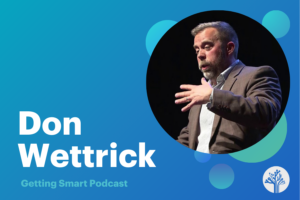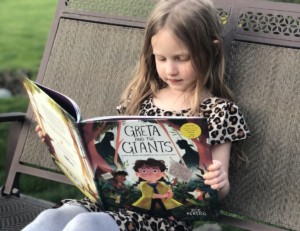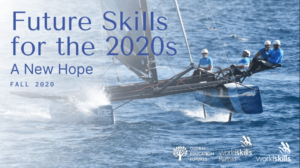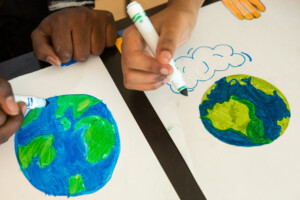Save The Planet–Starting Today

What are the most important issues of our time? Ending extreme poverty? Ending conflict? Access to basic sanitation? Reducing the harmful effects of climate change?
At the iNACOL Symposium (#iNACOL17) a group of us built a list of pressing issues that included many of the 17 Global Goals for Sustainable Development– achieving these goals would mean an end to extreme poverty, inequality and climate change by 2030.
Global Goals are a good start, but most are pressing problems that don’t fully reflect all of the impact opportunities of our time. Exponential technology (AI+big data+enabling tools) is producing extraordinary benefits–diseases will be eradicated, clean energy will be produced, great services will become inexpensive and widely available. The technology is moving so fast that it’s creating new issues including algorithmic bias, robotic ethics and genome editing that are swamping civic infrastructure.
The combination of incredible opportunity and new challenges suggests some additions to the list of #GlobalGoals. We added eight goals inspired by the Gates Foundation sponsored Grand Challenges and the National Academy of Engineering Grand Challenges, and another eight that reflect equipped human beings making the world better for others–topics including extending dignity, powerful expressions and beautiful shared spaces.

Consider these 32 draft goals our attempt to identify the issues that matter most. We welcome additions and amendments or new lists. Better yet, ask young people in your community to study this question and build a list.
The driving question of this blog is, if we have a list of the issues that will shape the future–an earth owner’s manual–when and how should we introduce them to young people?
A Curriculum That Matters
Some of these issues have plagued the human race as long as the species has been around. What’s new is differential evolution–technology is moving faster than physical and social evolution. Now that most human beings reside in cities that are connected in a global economy, these differential impacts are experienced more quickly by more people in a collision of complex human and manmade systems–just ask three million Puerto Ricans and a million Rohingya refugees in Bangladesh (who will be settled just in time for summer floods).
The combination of urbanization, globalization, and automation is improving lives for hundreds of millions but yielding unprecedented novelty and complexity–more displacement, more disasters.
The good news is that there’s never been a better time to make a difference. It’s never been easier to learn, it’s never been easier to build an app, to launch a campaign, to start an organization and raise money around a good idea. Impact entrepreneurs are creating value by picking a problem, developing some domain expertise, building a dataset and applying smart tools. We call this new formula for making a difference “Cause + Code.”
And, more good news, young people don’t need to wait, they can make a difference right now, right where they are. As illustrated by our recent conversation with Mario Basora, superintendent of Yellow Springs Schools, difference making can start in elementary school with students angry about the lack of equitable handicapped access in their community. High school students in Yellow Springs asked, “Is it too lates to save the planet?” They identified a local version of a global challenge that they could take on (Check out #GlobalGoals for more examples of youth taking on the local version of global challenges).
If we take citizenship preparation seriously, we should be encouraging young people to engage with the world’s most important issues by helping them frame projects around these goals. Here are six reasons:
- Extended and integrated challenges are the best way to promote deeper learning and develop readiness for the automation economy.
- Goal focused projects get kids into the community and connected with local resources (we call it #PlaceBasedEd).
- The goals include interesting and timely causes that many young people will find motivating–and engagement boosts attendance and learning.
- Engagement in #GlobalGoals is a chance to shift the paradigm from “prepare for a career 10 years from now” to “make a difference right here, right now.” Preparing for 10 years from now is important, but let’s help young people reflect on ways they can be a better learner, contributor, and citizen tomorrow.
- Taking on real challenges will promote creative and effective uses of technology shifting from consumption to collaboration to production.
- Making a contribution toward a goal students care about may be the best way to develop student agency–and agency may be the most important ingredient in difference making.
#ReallyReady To Make A Difference
Students who are Really Ready–for careers of the future and for difference making today– possess deeper learning and social and emotional skills. These skills are necessary for many situations in college, work and life. There are many specific skills students will need (see the 28 Skills of a Really Ready Student infographic) but to summarize, really ready students are:
1. Skilled critical thinkers. Really Ready students are able to approach novel and complex problems with confidence. Many of them will analyze big problems with big data sets and apply smart tools.
Critical thinking often is reserved for the students who have mastered basic-skills and ideas, but deeper learning experiences should be a part of every student’s secondary education. Just because a student is learning a language or may need additional help in a core academic area should not mean that they do not get opportunities to work on critical-thinking problems.
2. Great communicators. In our increasingly connected world, students need to be able to communicate their ideas in a variety of different environments (online, face-to-face, etc.) and formats (written, oral, etc.). In middle school and high school, students need communication skills when working in teams, presenting projects and with diverse groups of peers. Students also need to be able to articulate their needs, goals and strengths to colleagues and mentors that can then support them on their path to college or work.
3. Self-directed learners. Students need to be self-directed learners and able persist in order to meet their academic and personal goals. This is especially important for students who may not have a support system encouraging them to pursue their education. These students need learning experiences that are engaging, that encourage them to continue on, and that provide them the appropriate support and scaffolds to help them to be successful in middle and high school.
4. Open to a growth mindset. Students need to have a growth mindset or a belief that their most basic abilities can be developed through dedication and hard work. All students need to work on tasks that push them to persevere, even if they do not succeed in their first attempt. A growth mindset can be essential for students who are struggling academically and need to remember that they have strengths and the ability to succeed.
5. Able to demonstrate social and emotional skills. Students who are Really Ready are also able to interact with their peers and people in their communities. They demonstrate social and emotional skills such as leadership, self-awareness, grit and kindness. (Listen to this great conversation with Tim Shriver, CASEL chair.)
What Can Anyone Give You Greater Than Now?
Bill Stafford asked this great question–what can anyone give you greater than now?– in his “just do it” poem, You, Reading This Be Ready.
The question for us as educators is why have we organized and sanitized life preparation into isolated disciplines instead of asking young people to engage in the great issues of our time?
OK, the answer is complicated, I know there are tests and transcripts and traditions, but if we don’t give young people the earth owner’s manual, who will?
Another Stafford question for you and your students:
Will you ever bring a better gift for the world
than the breathing respect that you carry
wherever you go right now? Are you waiting
for time to show you some better thoughts?
In other words, just do it! Find a way to engage young people in the issues that matter–to them and to the world. Make room for a project in your class, create an integrated block with another teacher (like teachers at Oso New Tech), support an after school program focused on service, replace an AP class with self-directed research project (read about Catalyst projects at Singapore American School).
Great opportunity. Big threats. The paradox of the new economy is a good news, bad news story. What’s clear is that the time for traditional approaches is long gone. It’s time to share the owner’s manual with youth and invite them into the driver’s seat.
For more see








0 Comments
Leave a Comment
Your email address will not be published. All fields are required.